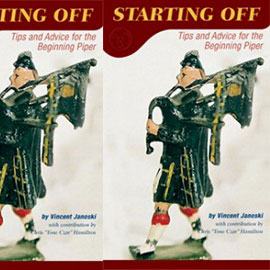Adopt Your Piping Power Pose!
 Body language can shape who you are. What kind of piper do you want to be? It might just start with how you stand and how you present yourself to your audience.
Body language can shape who you are. What kind of piper do you want to be? It might just start with how you stand and how you present yourself to your audience.
When we walk up to the judge, are you comparing your past performances as an indicator of how you will do now? Chances are, you are thinking of that last performance where you broke down, made a blunder or went off the tune. Does that make you feel afraid it might happen again? Of course it does. Your heart rate increases and the adrenaline starts pumping. You start up and it is all downhill from there.
A piper who is fumbling with their instrument with their hands sliding all over the place making weird chanter noises does not project authority or confidence. In fact, I would expect a judge to be predicting at that moment how long it will be until you break down during the performance.
What if you were told that by simply standing differently you would be able to overcome this fear and reduce the stress reaction that will get in the way of an optimal performance?
Our body can affect our brain and influence our mental state, our hormone levels, and our behavior. We don’t just think with our minds, we also think with our bodies. We’ve all heard the term “body language.” It is a valid means of expression and we read it in others all the time. Our body language projects real intention that is interpreted by others. We’ve all judged others based on the way they look, sit, move, etc. Music is also a means of expression and made as much by our heads as it is by our bodies. Our mind may influence our body but our body also affects our mind. There is  much to suggest that  our body language may have a large effect on our music making.
Our bodies react to what we are thinking and feeling. Who hasn’t looked up or grabbed their chin when they are deep in thought, or raised their arms when feeling victorious? One view of the winning band at the World Pipe Band Championships will give you an apt demonstration of how body language communicates feelings to others. But it also works the other way too. Research already exists that has shown positive influences on mood, memory, and learning with simple changes in body position. For example, the simple act of smiling actually makes us feel happier and increases the production of endorphins—the pleasure hormones of the brain. You don’t even have to feel happy. Simply holding a pencil in your teeth and forcing the face into a smile will achieve the same thing. Our mind switches to match what our bodies are doing.
Social psychologist Amy Cuddy talks about this in her research and recent TED presentation. She describes ways in which we can literally rewire our brains, change our behavior, and positively influence our biology and feelings about ourselves by adopting certain body postures. Her research shows that two minutes of “power posing” (elbows out, chin lifted, expansive posture, among other things) showed an increase in testosterone and a significant decrease in cortisol—the stress hormone at the core of the fight or flight response in our brains. Combine this “power pose” with more confident movement generally and we achieve enhanced memory and recall as well as feelings of greater confidence. This simple change can make us more willing to take risks and feel more competent. These changes in our perceptions and feelings can actually change outcomes in a real way. In her words: “Fake it ’til you become it.” In other words, act and move as the person/piper/musician you want to be.
So what would be the ideal “piper’s power pose?” If all of this works we should be able to enhance our memory performance and keep the nerves at bay. How this looks is called by different names. Sometimes we call it “presentation.” But it is also called “poise” and “composure.” The top solo bagpipers in the world project confidence and authority (even if they are not feeling it at that moment). Are they nervous when they play? You bet. As nervous as anyone else. But they rarely look it. The point is to project that confident presence even if you don’t feel it. Beyond that though, how do you stand or move before your competition? If you are nervous or scared, worried about your overall lack of competence and what might happen as you play in your competition, well, that is going to show in your body language before, during, and after your performance. It will also show up in the seemingly little things such as how you hold your instrument, or your tune up routine.
So, that means we need to reverse it. Instead of adopting a posture that conveys the fear and anxiety you’re feeling, we adopt the pose that projects the opposite of that: confidence, poise, and assurance. It’s time for a personal assessment. We want to present ourselves like the top soloists and project confidence and authority. Play in front of a mirror and really take a stock of how you stand when you play, when you’re not playing. Do you look like you are a Gold Medal winner taking the stage at the Glennfiddich? Let’s begin by posing as if you are.
Your stance is balanced on both legs with feet slightly apart. Your bagpipes are balanced comfortably on your shoulder with your left hand holding the top of your chanter or your chanter stock. Stand straight with shoulders back and square. Your right arm should be purposefully at your side with a slightly bent elbow. Head and chin up. Look straight ahead at your reflection. Hold that pose for two minutes. Now begin playing. Carry this pose through during your playing. Yoga instructors like to say that you should imagine a rope going through to the top of your head and that someone is pulling up on that rope. Your posture will naturally expand and straighten. Body position, stance, and general comfort have as much an impact on your general playing as anything else. You should look at ease and confident when you play. Your warm up routine should seem authoritative and sure. Your movements (walking as you tune, moving your hand up to tune your drones, changing the tape on your chanter) should be smooth and deliberate.
In essence, you are communicating to an audience or judge that they should be ready to hear something good. Even if you are still just a beginner and what you produce is still “developing,” as they say, standing and moving as if you are a capable, confident musician—adopting your piping power pose—will put you on the quicker path to becoming that very thing.
 Pipehacker
Pipehacker








